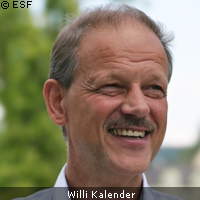Willi Kalender wins European Latsis Prize
The medical physicist Dr Willi Kalender has been awarded the 2007 European Latsis Prize for his outstanding contributions in the field of medical imaging. On receiving the €65,000 prize sponsored by the Geneva-based Latsis Foundation, Dr Kalender, from the Institute of Medical Physics at the Friedrich-Alexander-University Erlangen-Nürnberg in Germany said, 'I am overwhelmed and truly happy'. 'Medical Imaging has gotten quite a bit of attention in recent years. It is generally acknowledged that the advances in 3D imaging with different modalities such as CT, MR, PET and ultrasound has brought remarkable and practically relevant progress for diagnostic and therapeutic procedures. I hope that the award of the European Latsis Prize by the European Science Foundation in 2007 to work on medical imaging will have a further positive effect on this field of research,' he added. The European Latsis Prize was awarded on 29 November by the European Science Foundation (ESF) at a science policy conference looking into the European Research Area from an international perspective. The annual award goes to an individual or group who, in the opinion of their peers, has made 'outstanding and innovative contributions in a selected field of European research'. 'Since 1999, the European Latsis Prize has rewarded researchers who have made outstanding progress in European research,' commented ESF President Ian Halliday. 'The jury members all agreed that Professor Kalender's contributions made to scientific excellence, societal impact and European progress are particularly outstanding and he truly deserves to be awarded with this year's prize.' Professor Kalender is credited with the invention and development of volumetric spiral scan computer tomography (CT), a life changing radiological imaging tool. Spiral CT enabled the transition from sequential two-dimensional (2D) CT imaging to fast volumetric three-dimensional (3D) imaging, which led to a complete change of paradigm in imaging. Spiral CT also allows diagnostic imaging of a level and in areas that were not possible with conventional 2D CT imaging. Although his initial findings were met with disbelief and harsh criticism, nowadays, spiral CT has been fully integrated into clinical practice resulting in two considerable benefits for patient. The first is a reduction in examination times from half an hour down to as little as a few seconds and the second is the invention of completely new and more advanced applications. The development of spiral CT represents how successful translational research can contribute to both basic imaging science and clinical practice, a statement by the European Science Foundation reads. Since the Latsis Prize was launched in 1999, winners have included other pioneering scientists in the fields of climate research, nano-engineering, bioinformatics and cognitive sciences among others. The 2008 prize will go to a researcher in the field of astrophysics.



